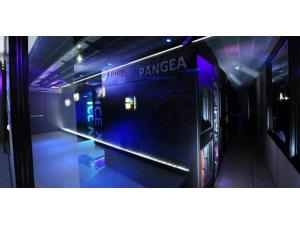IBM (NYSE: IBM) today announced it has built Pangea III, the world’s most powerful commercial supercomputer for Total, a supermajor global energy company operating in more than 130 countries. The new IBM POWER9-based supercomputer will help Total more accurately locate new resources and better assess the potential associated revenue opportunities. In addition, according to Total Pangea III requires 1.5 Megawatts, compared to 4.5 MW for its predecessor system. Combined with the increased performance of Pangea III, Total has reported that they have observed that the new system uses less than 10% the energy consumption per petaflop as its predecessor.
Pangea III is being built using the same IBM POWER9 AI-optimized, high-performance architecture as used in the U.S. Department of Energy’s Summit and Sierra supercomputers. Because IBM POWER9 is optimized to take advantage of attached accelerators, it is designed to help Total not only improve performance but also improve energy efficiency in their HPC workloads.
“Pangea III’s additional computing power enhances Total’s operational excellence. It enables Total to reduce geological risks in exploration and development, accelerate project maturation and delivery, and increases the value of our assets through optimized field operations, with all this at lower cost,” stated Arnaud Breuillac, President of Total Exploration & Production.
Exploring new oil and gas prospects, Total must first create an accurate picture of what lies underground, through the use of seismic data acquisition during exploration campaigns. Geoscientists then use these images to identify where oil and gas resources lie. This process creates massive amounts of data that IBM POWER9 sysems can easily handle with industry-exclusive technology.
In a competitive bidding process, Total selected IBM due to an industry-leading approach to GPU-accelerated computing. IBM worked with NVIDIA to jointly develop the industry’s only CPU-to-GPU NVIDIA NVLink connection, which allows for 5.6x faster memory bandwidth between the IBM POWER9 CPU and NVIDIA Tesla V100 Tensor Core GPUs than the compared x86-based systemsi. This will help Total to process the vast amount of data required in seismic modeling to get more accurate insights faster than they previously could.
Some of the fields where Total states that they plan to apply Pangea III’s compute power include:
– Higher Resolution Seismic Imaging in exploration and development phase – new algorithms will process large data sets to produce higher resolution images to help Total more reliably locate hydrocarbons below ground. This is especially useful in complex geological environments where layers of salt in the Earth can make getting accurate readings challenging, such as in Brazil, the Gulf of Mexico, Angola and the Eastern Mediterranean.
– Reliable Development and Production Models – through increased computing power, Total will use innovative reservoir simulation methods that, for example, integrate the field’s production history to generate more reliable predictive production models faster
– Asset Valuation and Selectivity – through early assessment of the value of exploration acreage and asset opportunities, Total will enhance selectivity in their new ventures.
“Based on the same IBM technology found in Summit and Sierra, the world’s smartest supercomputers, Pangea III demonstrates that IBM Power Systems are not just for the large government or research organizations,” said David Turek, Vice President of Exascale Systems for IBM Systems. “The world’s largest businesses, like Total, are now tapping that same technology to profoundly change how they operate. It also gives them room to explore the role IBM Power Systems can play against their most data-intensive workloads like hybrid could and AI.”
According to Total, Pangea III, which has a computing power of 25 petaflops (equivalent to 130,000 laptops), with a storage capacity of 50 petabytes, becomes the No. 11 amongst all public and private supercomputers globally. Pangea III is also the #11 overall on the latest iteration of the Top500 ranking of supercomputers.


